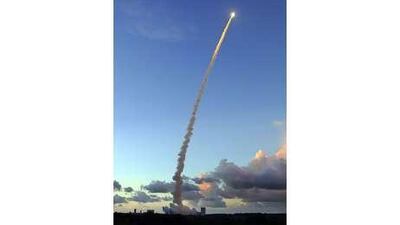The Arab Satellite Communications Organisation (Arabsat) and Yahsat are in talks to combine the reach of their satellites' transmissions to cover a swathe of the region extending from Egypt to Pakistan. The talks underscore a new space race between Arab satellite companies to provide services that will compete with terrestrial telecommunications operators.
Arabsat, a Saudi Arabia-based company established in 1976, has four satellites in orbit offering broadcast and other communications services, with three more on the way. Yahsat, a subsidiary of Mubadala Development, a strategic investment company owned by the Abu Dhabi Government, has plans to launch two satellites next year. Both companies will offer broadband internet connections, among other services, to consumers next year at rates comparable to those of terrestrial internet service providers. They will provide every person in the Arab world, regardless of where they live, access to the same quality of internet connections that people in urban centres have long enjoyed.
"We are talking to our friends at Yahsat to see how we can co-operate together to offer services to our common customers in the market," said Khalid Balkheyour, the president and chief executive of Arabsat. The companies are in the "early stages" of negotiations that would see each operator complement the other's coverage areas and services, Mr Balkheyour said. "We haven't talked at this point about revenue-sharing. However, if we ever decide to jointly launch a service, we are open to those discussions," he said. "We are holding those dialogues and we have no problem with putting those issues on the table."
Jassem al Zaabi, the chief executive of Yahsat, acknowledged the discussions but declined to comment further. "Our approach is to explore synergies with comparable market players," Mr al Zaabi said. Mr Balkheyour said the expansion of Arabsat's fleet with four next-generation satellites would cost US$1.6 billion (Dh5.87bn), while Mr al Zaabi said Yahsat had raised $1.2bn for its extraterrestrial plans.
"Competition helps us to drive our business better and we're ready for [Yahsat] because the customer will benefit from a better quality and new services," said Mr Balkheyour. Telecoms analysts say that a broadband service via a satellite will typically be used by residents of rural areas where it is difficult to access the internet. Mr Balkheyour said the Arabsat satellites would break even about halfway through their 20-year lifespan, even as research suggests the Middle Eastern satellite broadband market will have 600,000 subscribers by 2015.
"Of course, we're looking for revenue and we're looking for profit, but it's not the major goal of our company," he said. "Our target is to have connectivity and to provide that option for people to be connected. Now we have to package it in a way that is profitable to us and the customer." Arabsat and Yahsat are each in discussions with regulators in several countries to offer telecoms services by the time they launch their satellites. The operators will either offer services to customers directly or licence them to a local partner.
Progress on the first Yahsat satellite appears to be on track with a planned launch date in the first quarter of next year, said Mr al Zaabi. Production of the satellites "antenna farm" is complete and the company is training 12 Emiratis to take leadership roles in engineering and management. "We'll be targeting two types of clients: people who don't have access to broadband at all because of connectivity issues, and they exist throughout in the Middle East and Africa, and providing coverage where you cannot provide fibre-optic connections," Mr al Zaabi said.
Qatar recently announced it also was planning on launching a satellite in 2012, but it would be mainly used for broadcasting and government-related services. dgeorgecosh@thenational.ae

